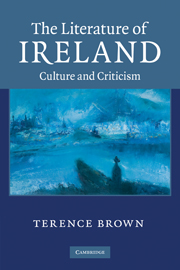Book contents
- Frontmatter
- Contents
- Acknowledgements
- Introduction
- 1 The Literary Revival: historical perspectives
- 2 Joyce's magic lantern
- 3 Music: the cultural issue
- 4 Modernism and revolution: rereading Yeats's ‘Easter 1916’
- 5 Shakespeare and the Irish self
- 6 Irish literature and the Great War
- 7 Ireland, Modernism and the 1930s
- 8 Post-modernists: Samuel Beckett and Flann O'Brien
- 9 Patrick Kavanagh: religious poet
- 10 MacNeice's Irelands: MacNeice's islands
- 11 Louis MacNeice and the Second World War
- 12 MacNeice and the puritan tradition
- 13 John Hewitt and memory: a reflection
- 14 Michael Longley and the Irish poetic tradition
- 15 Seamus Heaney: the witnessing eye and the speaking tongue
- 16 Derek Mahon: the poet and painting
- 17 Telling tales: Kennelly's Cromwell and Muldoon's ‘The More a Man Has the More a Man Wants’
- 18 Redeeming the time: John McGahern and John Banville
- 19 ‘Have we a context?’: transition, self and society in the theatre of Brian Friel
- 20 Hubert Butler and nationalism
- 21 The Irish Dylan Thomas: versions and influences
- Index
- References
21 - The Irish Dylan Thomas: versions and influences
Published online by Cambridge University Press: 05 June 2012
- Frontmatter
- Contents
- Acknowledgements
- Introduction
- 1 The Literary Revival: historical perspectives
- 2 Joyce's magic lantern
- 3 Music: the cultural issue
- 4 Modernism and revolution: rereading Yeats's ‘Easter 1916’
- 5 Shakespeare and the Irish self
- 6 Irish literature and the Great War
- 7 Ireland, Modernism and the 1930s
- 8 Post-modernists: Samuel Beckett and Flann O'Brien
- 9 Patrick Kavanagh: religious poet
- 10 MacNeice's Irelands: MacNeice's islands
- 11 Louis MacNeice and the Second World War
- 12 MacNeice and the puritan tradition
- 13 John Hewitt and memory: a reflection
- 14 Michael Longley and the Irish poetic tradition
- 15 Seamus Heaney: the witnessing eye and the speaking tongue
- 16 Derek Mahon: the poet and painting
- 17 Telling tales: Kennelly's Cromwell and Muldoon's ‘The More a Man Has the More a Man Wants’
- 18 Redeeming the time: John McGahern and John Banville
- 19 ‘Have we a context?’: transition, self and society in the theatre of Brian Friel
- 20 Hubert Butler and nationalism
- 21 The Irish Dylan Thomas: versions and influences
- Index
- References
Summary
In 2006 a horse named ‘Dylan Thomas’ won the Budweiser Irish Derby at the Curragh in County Kildare. One wonders what the ghost of the Irish poet and dedicated follower of racing form, Patrick Kavanagh, made of that turn-up for the books. Did he place a spectral bet on the favourite, named for a Welsh poet he had once admired for ‘fresh young attitude and vocabulary’, and a poet he had at one time seen as possessed of ‘the blood of life as it is lived’. Did he remember that he had also opined: ‘As far as I am concerned, Auden and Dylan Thomas, Moravia, Sartre, Pound are all Irish poets. They have all said the thing that delighted me, a man born in Ireland’ and put his celestial shirt on Dylan Thomas, whatever the odds (9 to 2, in fact). Or did he recall with bitterness that when he had been introduced to Thomas in London in 1951 (he was hoping for regular work with the BBC, where the Welsh poet was a less than securely ensconced broadcaster, alert one supposes, to a possible rival), Thomas had immediately, to quote Kavanagh's biographer, ‘launched into a broad, offensive imitation of his accent’ causing considerable hurt? If that came to mind in the afterlife, we may perhaps imagine the Mucker poet betting on any horse but Dylan Thomas, the name of a writer whose life and death as broth-of-a-boy, cadger, showman, backer of horses and drunk so resembled that of Dubliner Brendan Behan, whom Kavanagh loathed.
- Type
- Chapter
- Information
- The Literature of IrelandCulture and Criticism, pp. 260 - 272Publisher: Cambridge University PressPrint publication year: 2010



